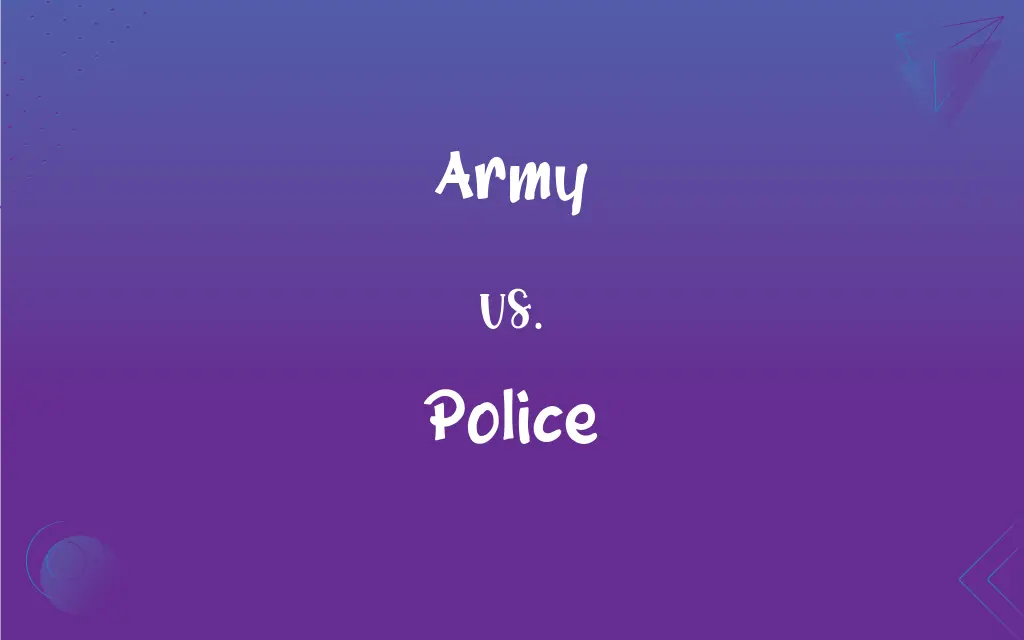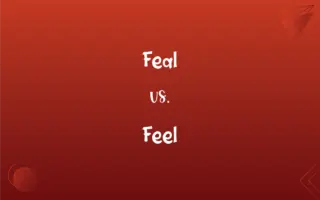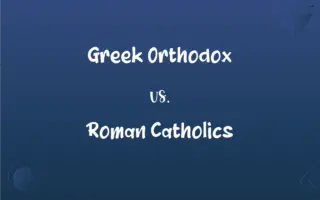Army vs. Police: What's the Difference?
Edited by Aimie Carlson || By Janet White || Published on October 3, 2023
The Army is a branch of the armed forces for land warfare, while the Police are civil officers enforcing laws and maintaining public order.

Key Differences
The Army and Police serve distinct roles in society, each vital to the stability and security of a nation. The Army is primarily a component of a nation's military forces responsible for land-based operations. Its primary focus is to defend the country from external threats, engage in combat operations abroad, and, in some cases, assist in national emergencies. On the other hand, the Police are a civil entity whose primary purpose is to maintain law and order within the country, ensuring the safety of its residents.
While the Army typically engages in large-scale operations often against foreign adversaries, the Police deal with day-to-day incidents, ranging from minor disturbances to serious crimes. The scale and nature of their operations differ substantially. The Army operates on battlefields, bases, and sometimes in foreign lands, while the Police operate within cities, towns, and communities, interacting directly with the public.
Training for the Army and Police is also tailored to their specific duties. Army training often emphasizes combat skills, strategy, and physical endurance, preparing soldiers for potential warfare. In contrast, police training focuses on investigative skills, community relations, law enforcement techniques, and crisis response to ensure public safety and uphold the law.
Jurisdictionally, the Army usually operates under the defense department or ministry of a nation and is bound by a different set of rules, often military law. Meanwhile, the Police operate under the interior or justice department and adhere to civil law. While both entities might collaborate in certain situations, their roles, responsibilities, and operational frameworks remain distinct.
Comparison Chart
Primary Role
Defense against external threats & land warfare.
Maintain internal law and order.
ADVERTISEMENT
Operation
Large-scale, often against foreign adversaries.
Day-to-day law enforcement within communities.
Training Focus
Combat skills, strategy, and endurance.
Investigative skills, community relations, law enforcement.
Jurisdiction
Usually under defense department, bound by military law.
Under interior/justice department, adhere to civil law.
Interaction
Primarily with adversaries and during specific operations.
Directly with the public in various situations.
Army and Police Definitions
Army
A large organized body of armed personnel trained for war.
The U.S. Army has bases all over the world.
ADVERTISEMENT
Police
A body of government officers entrusted with maintaining public order and safety.
The police arrived at the scene promptly.
Army
A unit of a nation's military forces.
He joined the Army to serve his country.
Police
To clean and keep clean.
Soldiers were assigned to police the barracks.
Army
A vast number or group of something.
An army of supporters showed up at the rally.
Police
A body of government employees trained in methods of law enforcement and crime prevention and detection and authorized to maintain the peace, safety, and order of the community.
Army
The land forces of a nation.
The Army is responsible for protecting the nation's borders.
Police
A body of persons with a similar organization and function
Campus police. Also called police force.
Army
A field army within the U.S. Army.
The First Army was integral during World War II.
Police
(Archaic) Regulation and control of the affairs of a community, especially with respect to maintenance of order, law, health, morals, safety, and other matters affecting the public welfare.
Army
A large body of people organized and trained for land warfare.
Police
(Informal) A group that admonishes, cautions, or reminds
Grammar police.
Fashion police.
Army
Often Army The entire military land forces of a country.
Police
The cleaning of a military base or other military area
Police of the barracks must be completed before inspection.
Army
A tactical and administrative military unit consisting of a headquarters, two or more corps, and auxiliary forces.
Police
The soldiers assigned to a specified maintenance duty.
Army
A large group of people or things, especially when organized for a specific cause or purpose
The construction army that built the Panama Canal.
A banquet with an army of waiters.
Police
To regulate, control, or keep in order with a law enforcement agency or other official group.
Army
A large, highly organized military force, concerned mainly with ground (rather than air or naval) operations.
The army was sent in to quell the uprising.
Police
To impose one's viewpoint or beliefs regarding, especially in an authoritarian way
Policing others' comments by implementing speech codes.
Army
Used absolutely for that entire branch of the armed forces.
The army received a bigger share of this year's budget increase than the navy or air force.
Police
To critique in a presumptuous or arrogant manner
Policed the grammar of everyone who commented on the blog post.
Army
(often capitalized) Within a vast military, a very large tactical contingent (e.g. a number of divisions).
The Fourth Army suffered such losses that its remainders were merged into the Second Army, also deployed on the Western front.
Police
To make (a military area, for example) neat in appearance
Policed the barracks.
Army
The governmental agency in charge of a state's army.
The army opposed the legislature's involvement.
Police
A public agency charged with enforcing laws and maintaining public order, usually being granted special privileges to do so, particularly
Call the police!
Army
(figuratively) A large group of people working toward the same purpose.
It took an army of accountants to uncover the fraud.
On sunny days the beaches draw armies of tourists of all kinds.
Police
A department of local (usually municipal) government responsible for general law enforcement.
The Sheriff's Department has jurisdiction across most of Chicago but focuses on the unincorporated area and tasks like prisoner transport, leaving the rest to the Chicago Police Department.
Army
(figuratively) A large group of social animals working toward the same purpose.
Our house is being attacked by an army of ants.
Police
(UK) A branch of the Home Office responsible for general law enforcement within a specific territory.
Army
(figuratively) Any multitude.
There was an army of construction cranes working on building the skyscraper.
Police
Any of the formally enacted law enforcement agencies at various levels of government.
Army
The military as a whole.
The People's Liberation Army Navy of China.
The Yugoslav Army consisted of the Navy, Ground Forces, and Air Force.
Iran's army consists of the Navy, Ground Forces, and Air Force.
Police
The staff of such a department or agency, particularly its officers; an individual police officer.
Army
A collection or body of men armed for war, esp. one organized in companies, battalions, regiments, brigades, and divisions, under proper officers.
Police
People who try to enforce norms or standards as if granted authority similar to the police.
Who called the fashion police?
Army
A body of persons organized for the advancement of a cause; as, the Blue Ribbon Army.
Police
Cleanup of a military facility, as a formal duty.
Army
A great number; a vast multitude; a host.
An army of good words.
Police
Synonym of administration, the regulation of a community or society.
Army
A permanent organization of the military land forces of a nation or state
Police
(obsolete) policy.
Army
A large number of people united for some specific purpose
Police
(obsolete) polity, civilization, a regulated community.
Police
(transitive) To enforce the law and keep order among (a group).
Extra security was hired to police the crowd at the big game.
Police
To clean up an area.
Police
To enforce norms or standards upon.
To police a person's identity
Police
A judicial and executive system, for the government of a city, town, or district, for the preservation of rights, order, cleanliness, health, etc., and for the enforcement of the laws and prevention of crime; the administration of the laws and regulations of a city, incorporated town, or borough.
Police
That which concerns the order of the community; the internal regulation of a state.
Police
The organized body of civil officers in a city, town, or district, whose particular duties are the preservation of good order, the prevention and detection of crime, and the enforcement of the laws.
Police
Military police, the body of soldiers detailed to preserve civil order and attend to sanitary arrangements in a camp or garrison.
Police
The cleaning of a camp or garrison, or the state a camp as to cleanliness.
Police
To keep in order by police.
Police
To make clean; as, to police a camp.
Police
The force of policemen and officers;
The law came looking for him
Police
Maintain the security of by carrying out a control
Police
The regulation and control of a community.
The police of such conduct fall under the school's jurisdiction.
Police
A private organization resembling a police force.
The event was secured by a private police agency.
Police
To control, regulate, or keep in order by use of police.
Volunteers helped police the park after the festival.
FAQs
Does the Army deal with civilian matters?
Generally, no, unless specifically assigned, like in national emergencies.
Is the Army always engaged in combat?
No, the Army also has non-combat roles and can assist in national emergencies.
Are there military police within the Army?
Yes, military police are a segment of the Army responsible for law enforcement within the military.
Can the Police operate internationally?
Generally, no. Police operate within their nation, but there are international police organizations.
Is the Army responsible for enforcing laws?
No, the Army's primary role is national defense, while the Police enforce laws.
Are police officers considered soldiers?
No, police officers are civil officers, not military personnel.
Can the Police be called upon during national threats?
Yes, in some cases, the Police collaborate with the military during significant threats.
Who oversees the Army's operations?
The defense department or ministry usually oversees the Army.
Are the Army and Police subjected to different laws?
Yes, the Army is often under military law, and the Police are under civil law.
Can someone work in both the Army and Police?
Yes, some people may transition between these roles during their careers.
Does the Army have the authority to arrest civilians?
Generally, no, unless under martial law or special circumstances.
Can the Police engage in military warfare?
Typically, no. The Police focus on civil law enforcement.
Is training for the Police and Army similar?
While there are overlaps, their training is specialized to their distinct roles.
Do the Police have a role in national defense?
Indirectly, by maintaining internal stability and security.
Do both Army and Police carry firearms?
Yes, both typically are trained and authorized to use firearms.
About Author
Written by
Janet WhiteJanet White has been an esteemed writer and blogger for Difference Wiki. Holding a Master's degree in Science and Medical Journalism from the prestigious Boston University, she has consistently demonstrated her expertise and passion for her field. When she's not immersed in her work, Janet relishes her time exercising, delving into a good book, and cherishing moments with friends and family.
Edited by
Aimie CarlsonAimie Carlson, holding a master's degree in English literature, is a fervent English language enthusiast. She lends her writing talents to Difference Wiki, a prominent website that specializes in comparisons, offering readers insightful analyses that both captivate and inform.







































































